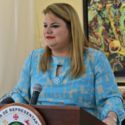Resident Commissioner Jennifer Gonzales-Colon is preparing a new Puerto Rico statehood bill. She introduced HR 260, the Puerto Rico Admission Act, as one of her first actions in office. This bill said, “It is the policy of the United States that the U.S. citizens of Puerto Rico may choose whether Puerto Rico will become a State or a nation through a plebiscite under that law. If the U.S. citizens of Puerto Rico reaffirm the territory’s choice of statehood through a plebiscite under Public Law 113–76, Federal laws that do not apply to Puerto Rico or apply differently to the territory than to the several States are amended or repealed to phase in the equal treatment of Puerto Rico with the several States by January 3, 2025, as shall be provided for in a plan submitted to the Congress and the President not later than 270 days after the enactment of this Act by the President’s Task Force on Puerto Rico’s Status, and Puerto Rico shall become a State on January 3, 2025.”
The plebiscite had a clear result: 97% of voters chose statehood.
Opponents of statehood are trying to discredit the law. Knowing that statehood would win in 2017 as it did in 2012, they called for a boycott of the vote. They are hoping that this will give Congress — the people who have the power to grant statehood to Puerto Rico — an excuse to go with the federal government’s fallback position.
The fallback position
“The present form of government in the Island appears to be unsatisfactory to a large number of its inhabitants,” said President Harry Truman in 1945. “We should be prepared to carry into effect whatever options are placed before the people of Puerto Rico, once the Puerto Ricans have expressed their preference.”
This may have been the first statement of the federal government’s basic position: whenever Puerto Rico makes up her mind, we’ll support her choice.
President Gerald Ford didn’t follow Truman’s example. “I believe that the appropriate status for Puerto Rico is statehood,” he said in 1976. “I propose, therefore, that the people of Puerto Rico and the Congress of the United States begin now to take those steps which will result in statehood for Puerto Rico. I will recommend to the 95th Congress the enactment of legislation providing for the admission of Puerto Rico as a State of the Union.”
Other presidents have spoken in support of statehood for Puerto Rico since then, but the standard position continues to be that the federal government will take action for Puerto Rico once all Puerto Ricans reach a consensus on status.
That’s not how democracy works.
In a hearing on Puerto Rico’s status where this fallback position was expressed, then Resident Commissioner Pedro Pierluisi said, “That’s not how democracy works.” He spoke the truth. Democracy does not require consensus.
Democratic decisions are made by the people who show up and vote. Anyone who chooses not to vote chooses to let the voters make the decision.
In the recent plebiscite, 97% of voters chose statehood. In 2012, 61% of voters who chose a preferred status chose statehood.
Puerto Rico has made up her mind.
It is now up to all of us, in Puerto Rico and in the 50 states, to insist that Congress respect that vote. Both political parties have said that they will support Puerto Rico’s decision. Contact your legislators now and let them know that you expect them to follow through.








No responses yet